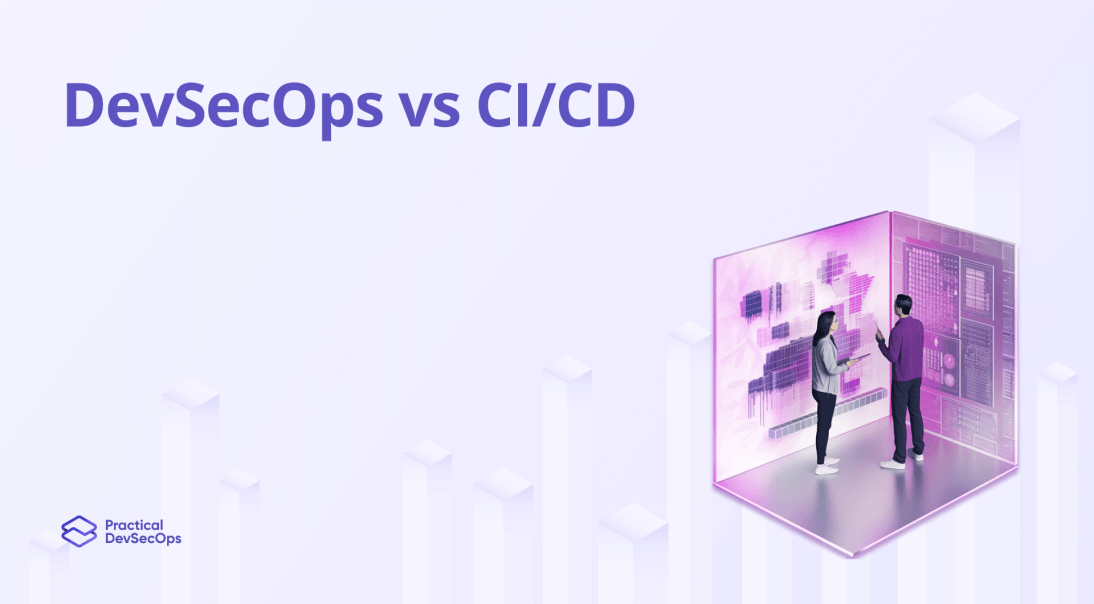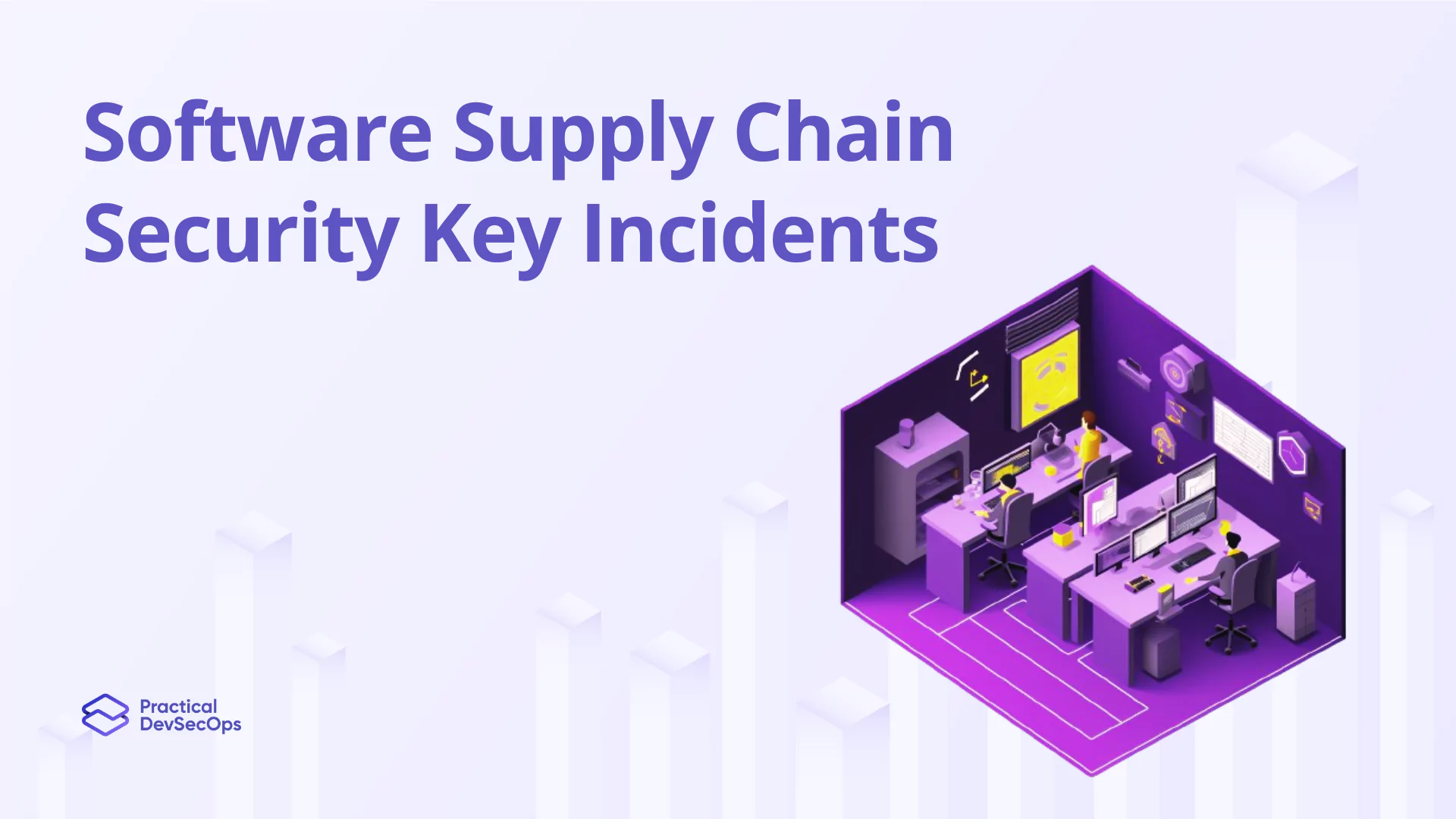In the swift world of software development, organizations are under constant pressure to release new features and updates quickly. Yet, the urgency to deliver must never undermine the security of the applications. DevSecOps and CI/CD are two methodologies tailored to meet this dual demand effectively.
This blog will examine how DevSecOps and CI/CD each play a pivotal role in creating a secure and efficient software development lifecycle. Join us as we delve into the unique contributions and benefits of both approaches in maintaining robust security without sacrificing speed.
DevSecOps vs CI/CD: A Comparison
DevSecOps and CI/CD are two methodologies that focus on enhancing security and agility in software development. DevSecOps integrates security throughout the SDLC, while CI/CD streamlines development through automation. The following table compares key aspects of DevSecOps and CI/CD:
| Aspect | DevSecOps | CI/CD |
| Focus | Integration of security throughout the development process | Automation and rapid delivery of software updates |
| Collaboration | Collaboration and shared responsibility among teams | Collaborative work but with less emphasis on shared responsibility |
| Security Integration | Early integration of security practices and automation | Automation of integration, testing, and deployment processes |
| Benefits | Proactive security, reduced vulnerabilities | Efficiency, faster time-to-market, and rapid software delivery |
| Automation | Automated security controls and tooling | Automated testing, build, and deployment processes |
Also Read, Best DevSecOps Tools
DevSecOps
DevSecOps, a combination of Development, Security, and Operations, emphasizes the integration of security throughout the entire software development process. It strives to ensure that security is not an afterthought but an integral part of the development pipeline.
Key Characteristics and Benefits
- Collaboration: DevSecOps fosters a culture of collaboration and shared responsibility among development, security, and operations teams. This helps create a security-oriented mindset and promotes seamless communication and cooperation.
- Shift-Left Security: In DevSecOps, security is introduced early in the development process. Security planning, threat modeling, secure coding practices, and automated security tests become an inherent part of the workflow. This approach helps identify and fix vulnerabilities at an early stage, reducing the likelihood of security incidents.
- Automation: Automation is a core principle of DevSecOps. Security controls, such as vulnerability scanning, code analysis, compliance checks, and security testing, are automated and integrated into the development pipeline. This ensures that security measures are consistently applied throughout the software development lifecycle.
Also Read, Best Books on DevSecOps
CI/CD: Continuous Integration and Continuous Deployment
CI/CD, short for Continuous Integration and Continuous Deployment, is a software development approach that focuses on automation and frequent delivery of application updates. It enables developers to work in smaller, manageable increments rather than lengthy, monolithic codebases.
Key Characteristics and Benefits
- Rapid Iteration: CI/CD allows for frequent integration and testing of code changes in a shared repository. This enables faster detection and resolution of issues as developers can identify problems early on and iterate rapidly.
- Automated Testing: Automated testing is a critical aspect of CI/CD, ensuring that code changes are thoroughly tested to maintain software quality standards. Automated tests reduce the risk of introducing bugs or breaking existing functionality.
- Efficient Deployment: CI/CD streamlines the deployment process by automating the release and deployment of tested code changes into production environments. This leads to faster time-to-market, as developers can deliver updates regularly and efficiently.
How to Integrate DevSecOps with CI/CD Pipelines?
Combining DevSecOps with CI/CD pipelines can create a robust, secure, and efficient development process. Here’s how to effectively integrate these methodologies.
Step-by-Step Integration Guide
- Establish a Collaborative Culture: Foster a culture of collaboration and shared responsibility among development, security, and operations teams. This ensures that security is a collective goal and is integrated into every phase of the development lifecycle.
- Embed Security in CI/CD Pipelines: Integrate security checks, such as static code analysis, dynamic application security testing (DAST), and software composition analysis (SCA), into your CI/CD pipelines.
- Automate Security Processes: Use automation to enforce security policies, conduct continuous security assessments, and monitor compliance. Automation tools can help ensure that security measures are applied consistently.
- Continuous Monitoring and Feedback Loops: Implement continuous monitoring to detect and respond to security incidents promptly. Use feedback loops to learn from past incidents and improve security practices continuously.
- Training and Awareness: Regularly train developers and operations teams on secure coding practices and the importance of security in the development process. This helps to build a security-conscious culture.
The Role of Security in CI/CD Pipelines
Security is a crucial aspect of CI/CD pipelines. Here’s why integrating security is essential and how to do it effectively.
Why is Security in CI/CD Pipelines Important?
- Early Detection of Vulnerabilities: Integrating security early in the CI/CD pipeline allows for the early detection and remediation of vulnerabilities, reducing the risk of security incidents in production.
- Compliance and Regulatory Requirements: Continuous security assessments ensure that applications comply with industry standards and regulatory requirements, avoiding potential legal and financial repercussions.
- Maintaining Customer Trust: A secure development process helps protect customer data and maintain their trust, which is crucial for the reputation and success of any organization.
How to Integrate Security in CI/CD Pipelines?
- Static Application Security Testing (SAST): Implement SAST tools to analyze code for security vulnerabilities during the development phase.
- Dynamic Application Security Testing (DAST): Use DAST tools to test running applications for vulnerabilities and security flaws.
- Software Composition Analysis (SCA): Use SCA tools to scan open-source components for known vulnerabilities.
- Container Security: Implement container security tools to ensure that containerized applications are secure and free from vulnerabilities.
- Infrastructure as Code (IaC) Security: Use IaC security tools to ensure that infrastructure deployments are secure and compliant with best practices.
Tools and Technologies for DevSecOps and CI/CD
Various tools and technologies can help implement DevSecOps and CI/CD effectively. Here are some recommended tools:
Recommended Tools
- Jenkins: A widely used CI/CD tool that supports a wide range of plugins for integrating security checks.
- GitLab: A comprehensive DevOps platform that includes CI/CD, security, and monitoring features.
- SonarQube: A popular static code analysis tool that helps detect security vulnerabilities in code.
- OWASP ZAP: An open-source dynamic application security testing tool.
- Docker: A containerization platform that supports secure application development and deployment.
- Kubernetes: An orchestration tool that helps manage containerized applications securely.
- Terraform: An Infrastructure as Code tool that allows for the secure deployment and management of infrastructure.
Real-World Examples: DevSecOps and CI/CD in Practice
Understanding how organizations implement DevSecOps and CI/CD can provide valuable insights.
Case Study: E-commerce Platform
- An e-commerce company integrated DevSecOps into their CI/CD pipelines to enhance security and agility. By automating security checks and fostering collaboration among teams, they reduced the average time to detect and remediate vulnerabilities by 50%.
Case Study: Financial Institution
- A financial institution used CI/CD pipelines with embedded security checks to streamline their development process. This allowed them to deliver updates faster while ensuring that security standards were met, resulting in a significant improvement in their security posture.
Frequently Asked Questions (FAQs)
What is the difference between DevSecOps and CI/CD?
DevSecOps focuses on integrating security practices throughout the development process, while CI/CD emphasizes the automation and rapid delivery of software updates. Both methodologies aim to enhance security and agility in software development.
Can DevSecOps be integrated with CI/CD pipelines?
Yes, DevSecOps can be integrated with CI/CD pipelines by embedding security checks and practices into the continuous integration and deployment processes. This ensures that security is maintained throughout the development lifecycle.
What are the benefits of combining DevSecOps with CI/CD?
Combining DevSecOps with CI/CD enhances security and efficiency, enabling early detection of vulnerabilities, continuous security monitoring, and faster delivery of secure software updates.
What tools are recommended for implementing DevSecOps and CI/CD?
Recommended tools include Jenkins, GitLab, SonarQube, OWASP ZAP, Docker, Kubernetes, and Terraform. These tools support various aspects of DevSecOps and CI/CD, such as code analysis, security testing, containerization, and infrastructure management.
How does automation enhance DevSecOps and CI/CD?
Automation ensures consistent application of security measures, continuous monitoring, and rapid response to security incidents. It also reduces manual effort, enabling faster and more efficient development and deployment processes.
What challenges might organizations face when integrating DevSecOps and CI/CD?
Common challenges include resistance to change, data silos, and metric overload. Overcoming these challenges requires fostering a collaborative culture, centralizing data, focusing on key metrics, and involving teams in the integration process.
Conclusion
DevSecOps and CI/CD are key for secure and agile software development. DevSecOps integrates security throughout the process, while CI/CD automates updates for quicker delivery. Combining them ensures a secure and efficient development cycle, minimizing vulnerabilities. Embracing these practices navigates modern software challenges, fostering secure innovation.
Interested in upskilling your team in DevSecOps?
Practical DevSecOps offers an excellent Certified DevSecOps Professional (CDP) course with hands-on training through browser-based labs, 24/7 instructor support, and the best learning resources to upskill in DevSecOps skills.
Start your team’s journey mastering DevSecOps today with Practical DevSecOps!
Also read, Why DevSecOps is a Good Career Option?






0 Comments